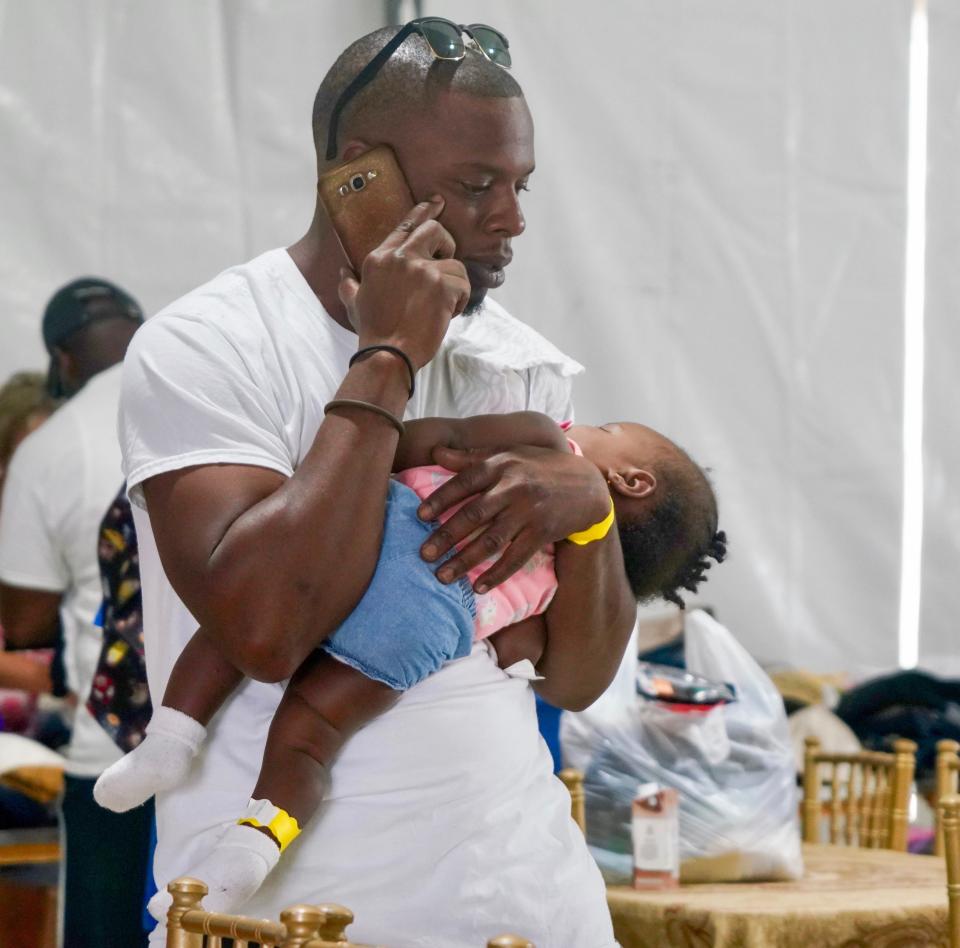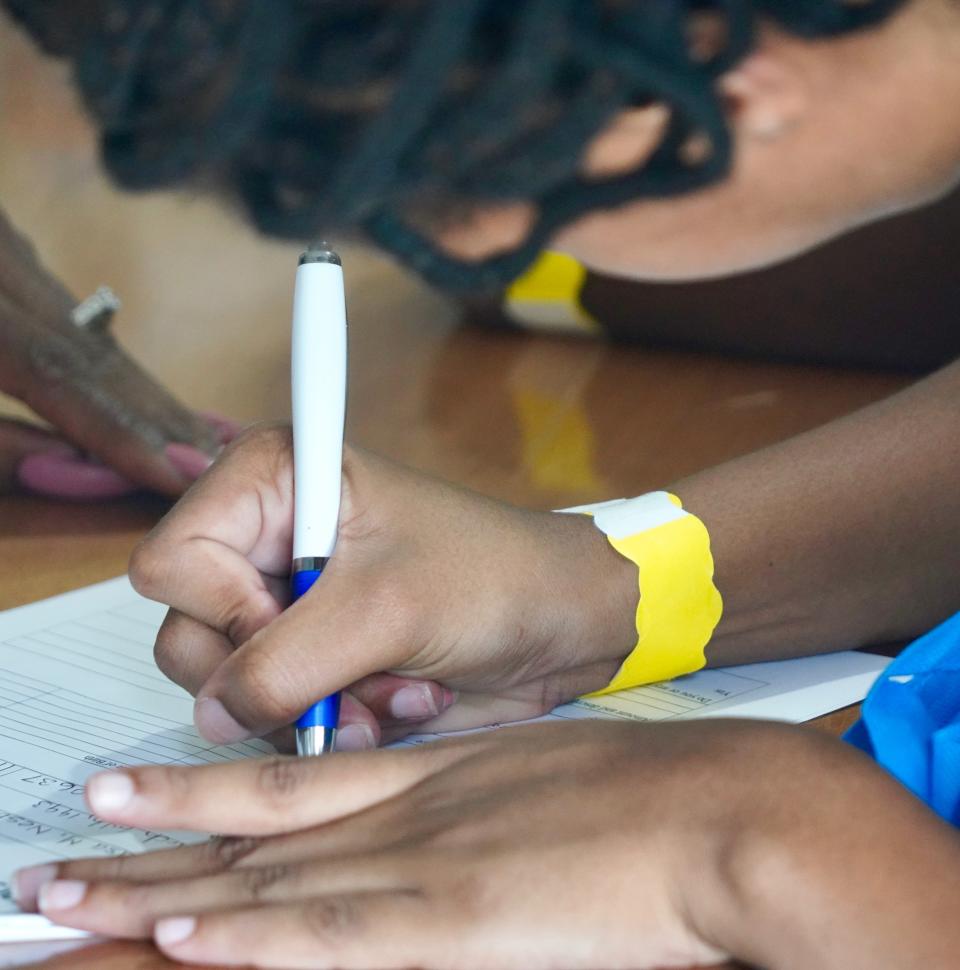Dazed and weary, Hurricane Dorian refugees descend on Bahamas capital of Nassau
NASSAU, Bahamas – They straggle through the door in small groups, uncertainty written across their faces.
A green or yellow band wraps around each person’s wrist. Green bands are for those with someplace to stay the night, maybe with friends or family.
They’re the easy ones.
Yellow bands are harder.
Those wrap the wrists of Hurricane Dorian refugees who have no one to help them here in Nassau, the capital island of this coral archipelago nation still staggered by the biggest hurricane to hit the Bahamas, a terrifyingly violent storm that sat atop neighboring Abaco and Grand Bahama for days.
Nonprofits, from the Red Cross to Rotary and church groups, are rapidly improving refugee processing on Nassau, staged out of a stifling warehouse-size tent filled with donated supplies and energetic volunteers who are processing the wrist-banded refugees.
“They wasn’t doing anything in Abaco. So it’s great to see people caring. It’s so nice,” said evacuee Cecil Grant, 31, as he cradled his sleeping daughter, Yalissa, 7 months.
Family reunited: 'You're alive. You're alive.' How one family hunted for loved ones amid Dorian's wreckage
Sunday morning found Grant, his fiancée and their three kids at the shelter at the Nassau airport as evacuation planes and helicopters clattered overhead.

Grant’s family slept at a friend’s house Saturday night after an agonizing wait to leave Abaco, where their house was destroyed a week ago. They initially took shelter at a government building but then crashed at a friend’s. Thursday they headed to the Marsh Harbour airport to try to evacuate.
“We walked in the rain to the airport pushing shopping carts with all our luggage,” he said. “We waited all day there and then we walked to where we were. And went back to the airport the next day. And the next day.”
Dorian lashes Canada: 500,000 lose power as unrelenting Dorian marches through Canada
Neither Marsh Harbour nor the Treasure Cay airports have functioning toilets, leaving the hundreds of people waiting there each day without access to running water or sanitary facilities, although volunteers had delivered drinking water and food.
“It was very nasty there,” Grant said.
That was one of the primary drivers for Grant to move his family to Nassau, where he hopes to stay after lining up a job as a landscaper or chef. Rescue workers are now dealing with evacuees in Nassau – 800 came Saturday; 1,000 Sunday via helicopter, boat and airplane – in addition to the existing crisis on Abaco and Grand Bahama.
Doctors have been warning of the health crisis that could easily erupt on those two hard-hit islands, especially Abaco, where a toxic stew of water sits atop one of the largest Marsh Harbour neighborhoods once home to thousands of Haitian immigrants using outhouses for toilets.

Authorities say at least 44 people have died, and the number is expected to rise dramatically as formal search teams begin their work in earnest.
'Paradise has been turned to hell': Residents, aid workers in Bahamas deal with Dorian devastation
All day Sunday, refugees poured into the processing center as volunteers asked them to take only a few days’ worth of clothing and children played with donated toys, the immediate crisis past. The sound of Haitian creole began to fill the room as more and more Haitian-born refugees arrived.
Rescue groups are also now reaching Abaco with shiploads of supplies and equipment. The Red Cross expected its cargo boat to arrive in Marsh Harbour on Sunday, bringing both aid and Restoring Family Links teams to help trace missing or out-of-context people.
While cellphones work intermittently in Marsh Harbour, people remaining on the island are scrounging for gasoline to power generators and recharge their phones.
In Nassau, the Red Cross had more than 200 volunteers collecting and distributing supplies and food directly to evacuees and also to government-run shelters.
Ferrying aid: Vintage plane helps carry aid to devastated Bahamas after Hurricane Dorian
USAID Administrator Mark Green met with Bahamian Prime Minister Hubert Minnis on Sunday after briefly touring Abaco, pledging the U.S. government’s full support. The U.S. military is assisting with relief efforts being led by USAID, which has brought in 89 people and four search dogs to pick through the rubble while simultaneously preparing for a long road to recovery.
The agency brought in 47 metric tons of relief supplies from the Miami warehouse to help an estimated 44,000 people, USAID officials said, and about $2.8 million has been allocated to support response efforts.
“What I was struck by was the focused nature of the devastation,” Green told reporters his meeting with Minnis. “There are parts of Abaco and the Bahamas that don’t show a great deal of damage and then there are clusters of communities that were devastated, almost as if though nuclear bombs were dropped on them. That’s how great the suffering is, the devastation is.
"We recognize that there is a long road ahead,” he said.
This article originally appeared on USA TODAY: Hurricane Dorian refugees descend on Bahamas capital Nassau

